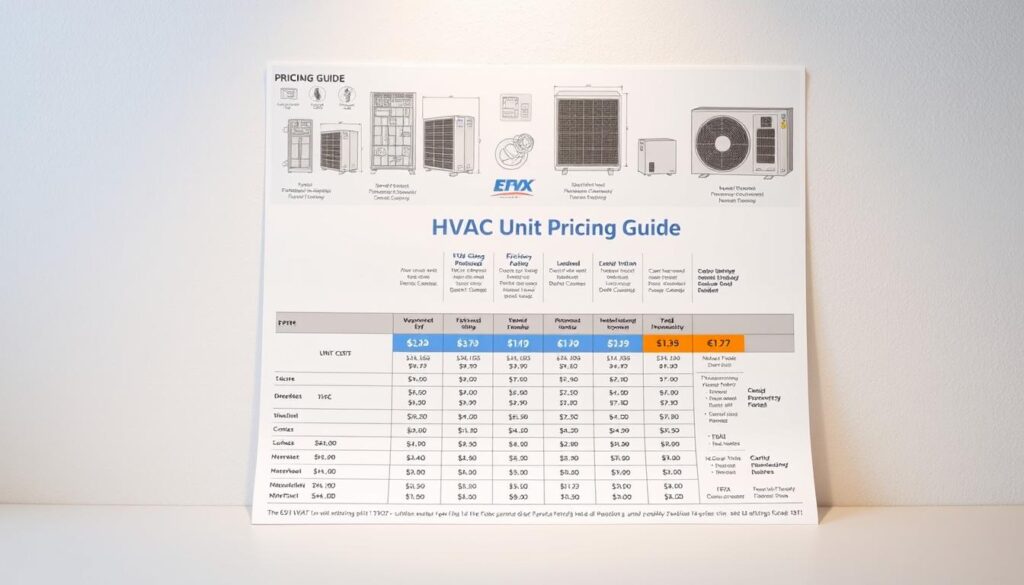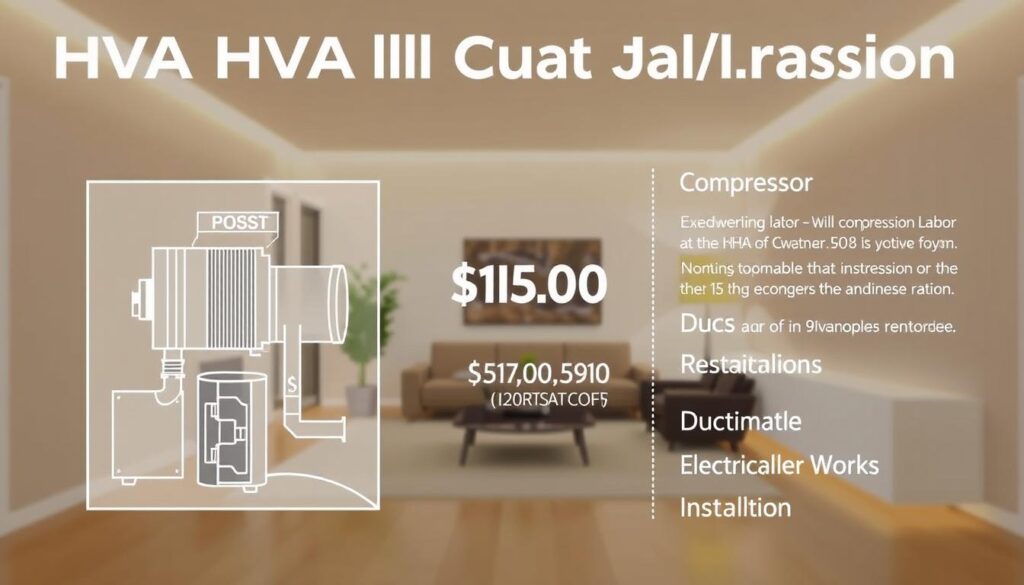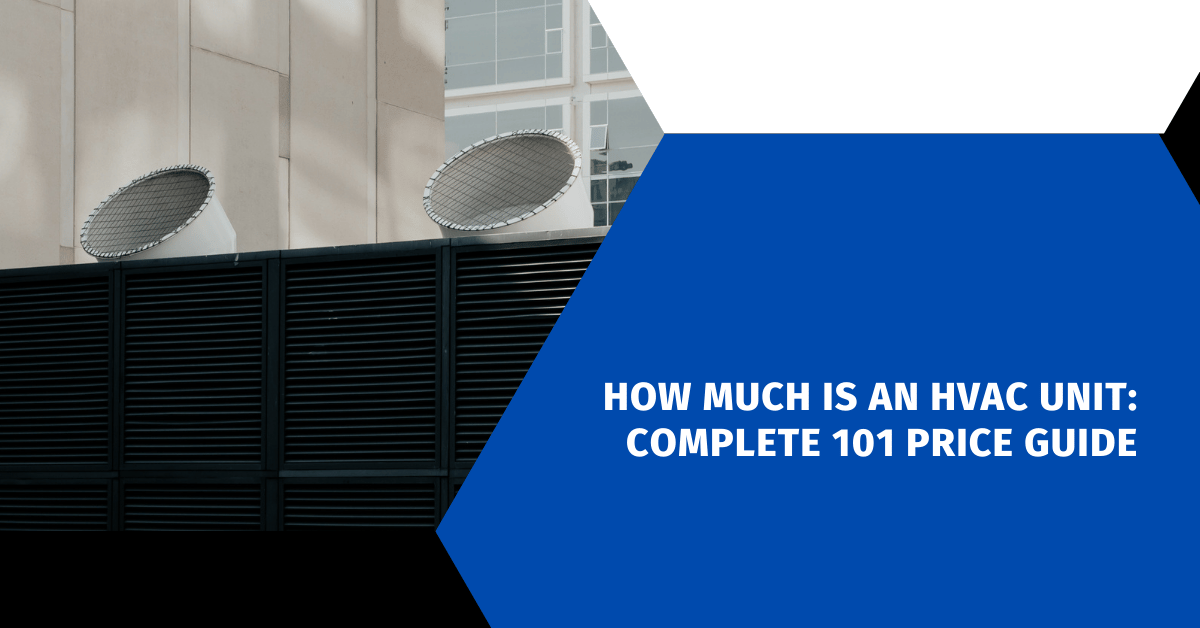Affiliate Disclosure
HVAC Guide Guys is a participant in the Amazon Services LLC Associates Program, an affiliate advertising program designed to provide a means for sites to earn advertising fees by advertising and linking to Amazon.
How Much Is an HVAC Unit? Are you tired of sweating in summer or freezing in winter? Not knowing the cost of an HVAC unit can make your home uncomfortable and expensive. Knowing the real cost of heating and cooling your home can change your comfort and budget.

Homeowners often feel lost when trying to figure out HVAC costs. A central air conditioning system can cost between $4,000 to $7,500, including installation. The price depends on your home’s size, the system’s efficiency, and your local climate.
This guide will help you understand HVAC unit pricing. We’ll cover system types, installation costs, and how to get the most value. You’ll learn how to keep your home comfortable without breaking the bank.
Key Takeaways
- Average HVAC system costs range from $4,000 to $7,500
- Prices vary based on home size and system complexity
- Energy efficiency significantly impacts long-term expenses
- Professional installation is key for best performance
- There are many financing options for HVAC investments
Table of Contents
Understanding HVAC System Types and Their Basic Costs
Choosing the right HVAC system is key to your home’s comfort and energy use. Each system has its own features and prices. These factors can impact your budget and future costs.
Looking at air conditioning costs, you’ll find several main types. Each is designed for different needs. Knowing these options helps you choose the best for your home.
Central Air Conditioning Systems
Central air is a top pick for cooling your whole home. Prices range from $3,000 to $7,000. These systems keep your home at a steady temperature.
- Ideal for larger homes
- Provides uniform cooling
- Requires professional installation
Heat Pumps and Split Systems
Heat pumps are great for both heating and cooling. They cost between $2,500 and $8,500. They’re efficient for homes in mild climates.
| System Type | Price Range | Key Features |
|---|---|---|
| Air-Source Heat Pump | $3,500 – $6,000 | Efficient in mild climates |
| Ductless Mini-Split | $2,500 – $5,500 | Flexible zone cooling |
Furnaces and Boilers
Furnaces and boilers are solid choices for heating. Prices range from $2,500 to $7,500. Your choice depends on your home’s heating needs and local weather.
- Gas furnaces: Most common heating method
- Electric furnaces: Lower upfront cost
- Boilers: Excellent for radiant floor heating
Factors That Influence HVAC Unit Pricing
Knowing what affects HVAC prices can help you choose wisely. HVAC prices vary based on several important factors.
When looking at HVAC prices, many things matter. These factors can change how much you’ll spend.
System Size and Capacity Requirements
The size of your HVAC system affects its cost. Important factors include:
- Square footage of your home
- Ceiling height
- Insulation quality
- Number of windows and doors
Choosing the wrong size can cause problems. It might not work well or cost more to run. A pro can help pick the right size for comfort and savings.
Energy Efficiency Ratings Impact
Systems with better efficiency ratings cost more upfront. But, they save money over time. The SEER rating is key for both initial cost and long-term savings.
“Investing in a high-efficiency system can reduce your energy bills by up to 20-30% annually.” – HVAC Energy Experts
Geographic Location and Climate Considerations
Your area’s climate affects your HVAC needs and prices. Places with very hot or cold weather need stronger systems. Coastal areas might need units that resist corrosion, while desert areas need cooling systems that work well.
Understanding these factors helps you invest in your home’s comfort and energy savings.
Explore Our HVAC Shop
Looking for top-rated HVAC tools, parts, and accessories? Visit our shop and find the perfect solution for your needs.
Visit the ShopHow Much Is an HVAC Unit for Different Home Sizes
Understanding the cost of an HVAC unit depends on your home’s size and features. The size of your home is key in choosing the right HVAC unit and its cost. Homeowners should look at several factors when figuring out the cost of an HVAC unit for their home.
Different home sizes need different HVAC capacities for efficient cooling and heating. Here’s a look at HVAC pricing based on home size:
| Home Size | Square Footage | HVAC Unit Size | Estimated Cost Range |
|---|---|---|---|
| Small Home | Up to 1,000 sq ft | 1.5-2 tons | $2,500 – $4,500 |
| Medium Home | 1,000-1,500 sq ft | 2-3 tons | $3,500 – $6,000 |
| Large Home | 1,500-2,500 sq ft | 3-5 tons | $5,000 – $8,500 |
Important factors to consider when choosing an HVAC unit include:
- Ceiling height and home layout
- Insulation quality
- Local climate conditions
- Number of windows and doors
Pro tip: Always consult with a professional HVAC technician for accurate sizing and pricing. Proper sizing ensures energy efficiency and optimal performance of your HVAC system.
Installation Costs and Labor Expenses
When planning your home comfort system, it’s key to understand hvac installation costs. The cost isn’t just the equipment price. Labor and additional needs also play big roles.

Professional HVAC installation costs between $750 and $1,500. This depends on several factors. Your specific hvac cost will change based on:
- Home size and layout complexity
- System type and efficiency rating
- Local labor rates
- Geographic location
Basic Installation Services
Basic services include removing old equipment and setting up new HVAC units. They also connect electrical systems and test the system’s performance. These services are the main part of your installation costs.
Additional Installation Requirements
Some homes need extra work, which can raise hvac installation costs. This includes:
- Ductwork modifications
- Electrical panel upgrades
- Insulation improvements
- Refrigerant line adjustments
Permit and Inspection Fees
Local governments need permits for HVAC installations. These cost between $50 and $300. They make sure your system is safe and meets building codes.
| Installation Component | Estimated Cost Range |
|---|---|
| Basic Labor | $500 – $1,000 |
| Ductwork Modifications | $500 – $1,500 |
| Permit Fees | $50 – $300 |
| Electrical Upgrades | $200 – $750 |
Pro tip: Always get multiple quotes and ensure technicians are certified. This guarantees quality installation and warranty protection.
Explore Our HVAC Shop
Looking for top-rated HVAC tools, parts, and accessories? Visit our shop and find the perfect solution for your needs.
Visit the ShopEnergy Efficiency and Long-term Cost Savings
When looking at HVAC system prices, think about energy efficiency. It can save you a lot of money over time. Modern air conditioning units are not just about the cost at first. They’re about how well they work and how much you can save.
Energy efficiency ratings are key to knowing if a system is worth it. The Seasonal Energy Efficiency Ratio (SEER) shows how well your HVAC system works. A higher SEER means using less energy and paying less for utilities.
- High-efficiency systems usually have SEER ratings between 16-22
- Lower SEER ratings (13-15) use more electricity
- Choosing a high-efficiency system can cut energy costs by 20-40%
To get the most out of your HVAC system and save on air conditioning costs, try these tips:
- Get a programmable or smart thermostat
- Make your home more insulated
- Keep your HVAC system in good shape
- Seal any air leaks around windows and doors
Pro tip: Even though high-efficiency systems cost more upfront, they usually save you money on energy within a few years.
Choosing energy efficiency is not a waste of money. It’s a smart choice for your home’s comfort and your wallet.
Brand Comparison and Price Ranges
Looking into hvac equipment prices? Knowing about different brands is key. Your HVAC system choice affects both your upfront cost and long-term performance.
The HVAC market has many options, from affordable to high-end brands. Each type has its own benefits for your hvac system price.
Premium Brands: Quality and Performance
Premium HVAC brands offer:
- Advanced technology integration
- Higher energy efficiency ratings
- More sophisticated temperature control
- Longer expected equipment lifespan
“Investing in a premium brand can mean lower long-term maintenance costs and improved home comfort.” – HVAC Industry Expert
Budget-Friendly Options: Smart Savings
Budget HVAC brands provide:
- Lower upfront costs
- Basic functionality
- Adequate cooling and heating
- Shorter warranty periods
Warranty Considerations
Warranty coverage varies a lot between brands. Premium brands usually offer:
- 10-12 year parts warranties
- Comprehensive equipment protection
- Extended service agreements
Budget brands have shorter 5-7 year warranties. This might lead to extra costs later on.
Your home needs, budget, and future plans will guide you to the right HVAC brand.
Maintenance Costs and Annual Operating Expenses
Knowing the ongoing hvac cost is key for homeowners. It helps manage heating system costs well. Regular maintenance stops expensive repairs and makes your HVAC system last longer.
Annual maintenance for HVAC systems costs between $100 to $500. This depends on your system’s type and complexity. Routine care saves money by avoiding big breakdowns and boosting energy efficiency.
- Basic maintenance tasks include:
- Air filter replacement
- Cleaning air ducts
- Checking refrigerant levels
- Inspecting electrical connections
Your annual operating expenses change based on several factors:
| Factor | Impact on HVAC Cost |
|---|---|
| System Efficiency | High-efficiency units reduce energy consumption |
| Local Climate | Extreme temperatures increase operating expenses |
| Home Insulation | Better insulation lowers heating system cost |
Pro tip: Schedule professional maintenance annually. This keeps your HVAC system running well and cuts down on unexpected repair costs.
Being proactive with maintenance and knowing your system’s needs helps manage hvac costs. This ensures your home stays comfortable all year.
Explore Our HVAC Shop
Looking for top-rated HVAC tools, parts, and accessories? Visit our shop and find the perfect solution for your needs.
Visit the ShopFinancing Options and Payment Plans

Managing the cost of HVAC systems can be tough for homeowners. Knowing your financing options can make it easier. It helps spread out the cost over time.
Most HVAC companies offer flexible payment plans. These plans help you get home comfort without breaking the bank. You can choose from:
- Manufacturer-sponsored financing programs
- Personal bank loans
- Home equity lines of credit
- Credit card payment options
When looking at financing for your HVAC, keep these points in mind:
| Financing Type | Interest Rate | Typical Term Length |
|---|---|---|
| Manufacturer Financing | 0-9.99% | 1-5 years |
| Personal Bank Loan | 5-15% | 3-7 years |
| Home Equity Line | 3-8% | 5-15 years |
Here are some ways to lower your HVAC costs:
- Look for seasonal promotions
- Check for energy efficiency tax credits
- Negotiate installation packages
- Compare multiple financing offers
Pro tip: Always read the fine print and understand the total cost of financing before committing to a payment plan.
Conclusion
Finding the right HVAC unit is more than just looking at the price. You need to think about how much it will cost over time. This means looking at both the initial cost and how much energy it will use.
When you’re choosing an HVAC system, doing your research is key. Get quotes from certified pros who can check your home’s needs. Look at energy ratings, the brand’s reputation, and the warranty. These will affect how well your system works and how much it costs to run.
Don’t just go for the cheapest option. Spend time learning about different systems and what they need to work right. This way, you can find a system that’s comfortable, saves energy, and is good for your wallet.
Your aim is to find an HVAC unit that fits your needs and is worth the cost. Take your time, ask lots of questions, and work with trusted HVAC experts. They can help you make a smart choice for your home.

